
List of battleships of the United States Navy
Encyclopedia
This list of battleship
s of the United States Navy
includes all ships with the hull classification symbol
"BB". A number of these were started but never completed.
American battleships can be roughly divided into five types: coastal defense, pre-dreadnought, dreadnought, standard, and fast.
design characteristics and entered service between 1900 and 1909. The definitive American predreadnought was the penultimate class of the type, the Connecticut class, sporting the usual four-gun array of 12" weapons, a very heavy intermediate and secondary battery, and a moderate tertiary battery. They were good sea boats and heavily armed and armored for their type. The final American predreadnought class, the Mississippi-class second-class battleships, were a poorly thought out experiment in increasing numbers regardless of quality, and the USN quickly wished to replace them, doing so in 1914, selling them to Greece to pay for a new dreadnought battleship, USS South Carolina.
The dreadnoughts, BB-26 South Carolina through BB-35 Texas, commissioned between 1910 and 1914, uniformly possessed twin turrets, introduced the superimposed turret arrangement that would later become standard on all battleships, and had relatively heavy armor and moderate speed (19–21 knots). Five of the ten ships favored the more mature vertical triple expansion (VTE) propulsion over fuel-inefficient but faster direct-drive turbines. The ships possessed 8 (South Carolina class), 10 (Delaware and Florida) or 12 (Wyoming class) 12" guns, or 10 (New York class) 14" guns. The dreadnoughts gave good service, the last two classes surviving through World War II before being scrapped. However, they had some faults that were never worked out, and the midships turrets in the ten and twelve-gun ships were located near boilers and high-pressure steam lines, a factor that made refrigeration very difficult and problematic in hot climates. One of their number, Texas (BB-35), is the last remaining American battleship of the pre–World War II era and the only remaining dreadnought in the world.
Next came the twelve Standards, beginning with BB-36 Nevada. The last ship commissioned was BB-48 West Virginia (BB-49 through 54 were also Standards, but were never commissioned, and scrapped under the Washington Naval Treaty
), commissioned over the period 1914 to 1920. Oklahoma (BB-37) was the last American battleship commissioned with triple expansion machinery, all other Standards and the World War II ships used geared steam turbine
s. The Standards were a group of ships with four turrets, a 21-knot top speed, a 700 yard tactical diameter at top speed, and heavy armor distributed on the "All or Nothing" principle. Armament was fairly consistent, starting with ten 14" guns in the Nevadas, twelve in the Pennsylvanias, New Mexicos and Tennessees, and eight 16" guns in the Colorados. Oklahoma (BB-37) was the last American capital ship (battleship or fleet carrier) to be equipped with reciprocating engines.
design (technically post-Panamax, as they exceeded normal Panamax beam by two feet, but they were still able to transit the canal). They were fast battleships, and could travel with the aircraft carrier
s at cruising speed (their speed was not intended for that role, but rather so they could run down and destroy enemy battlecruiser
s). They possessed almost completely homogenous main armament (nine 16" guns in each ship, the sole difference being an increase in length from 45 to 50 calibers with the Iowa class vessels), very high speed relative to older American designs (28 knots in the North Carolina and South Dakota classes, 33 in the Iowa class), and moderate armor. The North Carolinas were of particular concern, as their protection was rated as only "adequate" against the 16" superheavy weapon. They had been designed with, and armored against, a battery of three quadruple 14" guns, then changed to triple 16" guns after the escalator clause in the Second London Naval Treaty
had been triggered. Secondary in these ships was almost homogenous as well: Except for South Dakota, configured as a flagship, the other nine ships of this group sported a uniform 20-gun 5" secondary battery (South Dakota deleted two 5" mounts to make room for flag facilities). Visually, the World War II ships are distinguished by their triple-turret arrangement and the massive columnar mast that dominates their superstructure. The last ship, Wisconsin (BB-64), commissioned in 1944 (Wisconsin was approved last; however, Missouri commissioned 3 months later, due to delays from additional aircraft carrier
construction). Missouri (BB-63), famous for being the ship on which the Japanese instrument of surrender
was signed, was the last battleship in the world to decommission on March 31, 1992. Seven of these ten ships are still in existence as of 2006. South Dakota, Washington and Indiana were scrapped, but the remainder are either now museum ship
s or (Iowa) slated to become museum ships. There was intended to be another class of five of these ships, the Montana class (BB-67 Montana through BB-71 Louisiana), but they were canceled before being laid down in favor of a greater number of aircraft carrier
s. The Montana class ships would have been built to a post-Panamax design, and carried a greater number of guns (12x 16") than the other ships; otherwise they would have been homogenous with the rest of the World War II battleships.
In October 2006 the last battleships (USS Iowa
and USS Wisconsin
) were stricken from the Naval Registry.
Except for Kearsarge
, named by an act of Congress, all American battleships have been named for states, and every state has had at least one battleship named for it except Alaska
and Hawaii
. They did not become states until 1959, after the end of battleship building, although the Large Cruisers USS Alaska (CB-1)
and USS Guam (CB-2)
were built during WWII
. The third of the class, USS Hawaii (CB-3)
, was never completed. Two battleships have been authorized to be named for Montana
, but both were canceled before commissioning. The pre-dreadnoughts
USS Zrinyi (formerly the Austrian
SMS Zrinyi
),
USS Radetzky (formerly the Austrian
SMS Radetzky
), and
USS Ostfriesland
(formerly the German SMS Ostfriesland),
taken as prizes of war after World War I
, were commissioned in the US Navy, but were not assigned hull classification symbol
s.
No American battleship has ever been lost at sea, though some have been sunk in port and others sunk as targets.
USS Maine
.jpg)
USS Texas
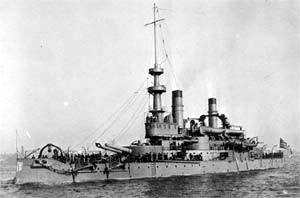
Indiana class
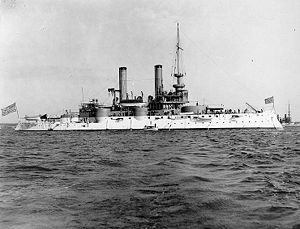
USS Iowa
Kearsarge class
_1912.jpg)
Illinois class
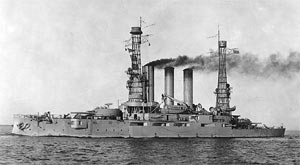
Maine class
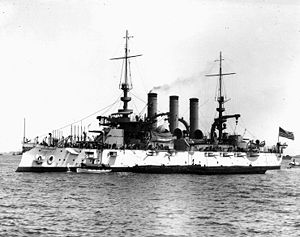
Virginia class
Connecticut class
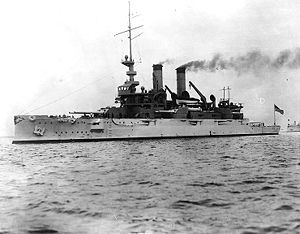
Mississippi class
South Carolina class

Delaware class
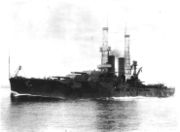
Florida class
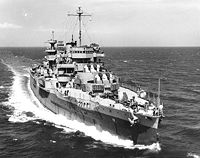
Wyoming class
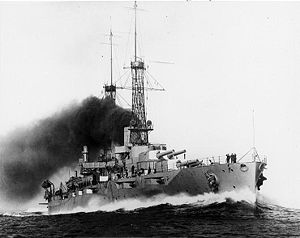
New York class
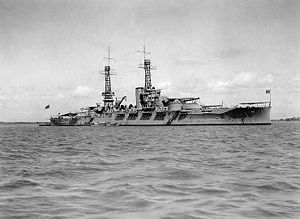
Nevada class
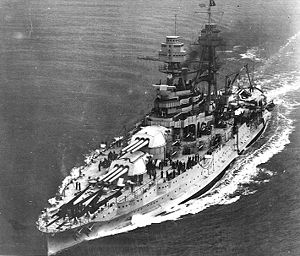
Pennsylvania class
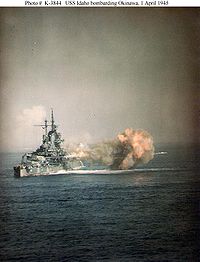
New Mexico class
Tennessee class
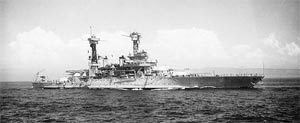
Colorado class
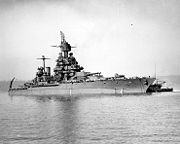
South Dakota class
North Carolina class
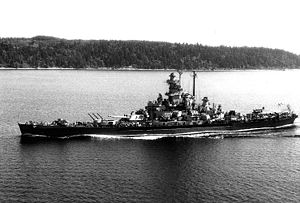
South Dakota class
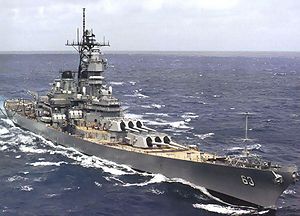
Iowa class

Montana class
Battleship
A battleship is a large armored warship with a main battery consisting of heavy caliber guns. Battleships were larger, better armed and armored than cruisers and destroyers. As the largest armed ships in a fleet, battleships were used to attain command of the sea and represented the apex of a...
s of the United States Navy
United States Navy
The United States Navy is the naval warfare service branch of the United States Armed Forces and one of the seven uniformed services of the United States. The U.S. Navy is the largest in the world; its battle fleet tonnage is greater than that of the next 13 largest navies combined. The U.S...
includes all ships with the hull classification symbol
Hull classification symbol
The United States Navy, United States Coast Guard, and United States National Oceanic and Atmospheric Administration use hull classification symbols to identify their ship types and each individual ship within each type...
"BB". A number of these were started but never completed.
American battleships can be roughly divided into five types: coastal defense, pre-dreadnought, dreadnought, standard, and fast.
Late 1800s–1900s
Maine and Texas were part of the "New Navy" program of the 1880s. They, and BB-1 to BB-4 were authorized as "coast defense battleships". The next group, BB-5 Kearsarge through BB-25 New Hampshire, followed general global pre-dreadnoughtPre-dreadnought
Pre-dreadnought battleship is the general term for all of the types of sea-going battleships built between the mid-1890s and 1905. Pre-dreadnoughts replaced the ironclad warships of the 1870s and 1880s...
design characteristics and entered service between 1900 and 1909. The definitive American predreadnought was the penultimate class of the type, the Connecticut class, sporting the usual four-gun array of 12" weapons, a very heavy intermediate and secondary battery, and a moderate tertiary battery. They were good sea boats and heavily armed and armored for their type. The final American predreadnought class, the Mississippi-class second-class battleships, were a poorly thought out experiment in increasing numbers regardless of quality, and the USN quickly wished to replace them, doing so in 1914, selling them to Greece to pay for a new dreadnought battleship, USS South Carolina.
The dreadnoughts, BB-26 South Carolina through BB-35 Texas, commissioned between 1910 and 1914, uniformly possessed twin turrets, introduced the superimposed turret arrangement that would later become standard on all battleships, and had relatively heavy armor and moderate speed (19–21 knots). Five of the ten ships favored the more mature vertical triple expansion (VTE) propulsion over fuel-inefficient but faster direct-drive turbines. The ships possessed 8 (South Carolina class), 10 (Delaware and Florida) or 12 (Wyoming class) 12" guns, or 10 (New York class) 14" guns. The dreadnoughts gave good service, the last two classes surviving through World War II before being scrapped. However, they had some faults that were never worked out, and the midships turrets in the ten and twelve-gun ships were located near boilers and high-pressure steam lines, a factor that made refrigeration very difficult and problematic in hot climates. One of their number, Texas (BB-35), is the last remaining American battleship of the pre–World War II era and the only remaining dreadnought in the world.
Next came the twelve Standards, beginning with BB-36 Nevada. The last ship commissioned was BB-48 West Virginia (BB-49 through 54 were also Standards, but were never commissioned, and scrapped under the Washington Naval Treaty
Washington Naval Treaty
The Washington Naval Treaty, also known as the Five-Power Treaty, was an attempt to cap and limit, and "prevent 'further' costly escalation" of the naval arms race that had begun after World War I between various International powers, each of which had significant naval fleets. The treaty was...
), commissioned over the period 1914 to 1920. Oklahoma (BB-37) was the last American battleship commissioned with triple expansion machinery, all other Standards and the World War II ships used geared steam turbine
Steam turbine
A steam turbine is a mechanical device that extracts thermal energy from pressurized steam, and converts it into rotary motion. Its modern manifestation was invented by Sir Charles Parsons in 1884....
s. The Standards were a group of ships with four turrets, a 21-knot top speed, a 700 yard tactical diameter at top speed, and heavy armor distributed on the "All or Nothing" principle. Armament was fairly consistent, starting with ten 14" guns in the Nevadas, twelve in the Pennsylvanias, New Mexicos and Tennessees, and eight 16" guns in the Colorados. Oklahoma (BB-37) was the last American capital ship (battleship or fleet carrier) to be equipped with reciprocating engines.
Mid to late 1900s
After the 1930s "builders holiday," the USN commissioned ten more battleships of an entirely new style, the so-called fast battleship. These ships began with BB-55 North Carolina and the last ship laid down was BB-66 Kentucky (the last ship completed was BB-64 Wisconsin). These ships were a nearly clean break from previous American design practices. All ten ships were built to a PanamaxPanamax
Panamax and New Panamax are popular terms for the size limits for ships traveling through the Panama Canal. Formally, the limits and requirements are published by the Panama Canal Authority titled "Vessel Requirements"...
design (technically post-Panamax, as they exceeded normal Panamax beam by two feet, but they were still able to transit the canal). They were fast battleships, and could travel with the aircraft carrier
Aircraft carrier
An aircraft carrier is a warship designed with a primary mission of deploying and recovering aircraft, acting as a seagoing airbase. Aircraft carriers thus allow a naval force to project air power worldwide without having to depend on local bases for staging aircraft operations...
s at cruising speed (their speed was not intended for that role, but rather so they could run down and destroy enemy battlecruiser
Battlecruiser
Battlecruisers were large capital ships built in the first half of the 20th century. They were developed in the first decade of the century as the successor to the armoured cruiser, but their evolution was more closely linked to that of the dreadnought battleship...
s). They possessed almost completely homogenous main armament (nine 16" guns in each ship, the sole difference being an increase in length from 45 to 50 calibers with the Iowa class vessels), very high speed relative to older American designs (28 knots in the North Carolina and South Dakota classes, 33 in the Iowa class), and moderate armor. The North Carolinas were of particular concern, as their protection was rated as only "adequate" against the 16" superheavy weapon. They had been designed with, and armored against, a battery of three quadruple 14" guns, then changed to triple 16" guns after the escalator clause in the Second London Naval Treaty
Second London Naval Treaty
The Second London Naval Disarmament Conference opened in London, the United Kingdom, on 9 December 1935. It resulted in the Second London Naval Treaty which was signed on 25 March 1936.- Description :...
had been triggered. Secondary in these ships was almost homogenous as well: Except for South Dakota, configured as a flagship, the other nine ships of this group sported a uniform 20-gun 5" secondary battery (South Dakota deleted two 5" mounts to make room for flag facilities). Visually, the World War II ships are distinguished by their triple-turret arrangement and the massive columnar mast that dominates their superstructure. The last ship, Wisconsin (BB-64), commissioned in 1944 (Wisconsin was approved last; however, Missouri commissioned 3 months later, due to delays from additional aircraft carrier
Aircraft carrier
An aircraft carrier is a warship designed with a primary mission of deploying and recovering aircraft, acting as a seagoing airbase. Aircraft carriers thus allow a naval force to project air power worldwide without having to depend on local bases for staging aircraft operations...
construction). Missouri (BB-63), famous for being the ship on which the Japanese instrument of surrender
Japanese Instrument of Surrender
The Japanese Instrument of Surrender was the written agreement that enabled the Surrender of Japan, marking the end of World War II. It was signed by representatives from the Empire of Japan, the United States of America, the Republic of China, the United Kingdom, the Union of Soviet Socialist...
was signed, was the last battleship in the world to decommission on March 31, 1992. Seven of these ten ships are still in existence as of 2006. South Dakota, Washington and Indiana were scrapped, but the remainder are either now museum ship
Museum ship
A museum ship, or sometimes memorial ship, is a ship that has been preserved and converted into a museum open to the public, for educational or memorial purposes...
s or (Iowa) slated to become museum ships. There was intended to be another class of five of these ships, the Montana class (BB-67 Montana through BB-71 Louisiana), but they were canceled before being laid down in favor of a greater number of aircraft carrier
Aircraft carrier
An aircraft carrier is a warship designed with a primary mission of deploying and recovering aircraft, acting as a seagoing airbase. Aircraft carriers thus allow a naval force to project air power worldwide without having to depend on local bases for staging aircraft operations...
s. The Montana class ships would have been built to a post-Panamax design, and carried a greater number of guns (12x 16") than the other ships; otherwise they would have been homogenous with the rest of the World War II battleships.
In October 2006 the last battleships (USS Iowa
USS Iowa (BB-61)
USS Iowa was the lead ship of her class of battleship and the fourth in the United States Navy to be named in honor of the 29th state...
and USS Wisconsin
USS Wisconsin (BB-64)
USS Wisconsin , "Wisky" or "WisKy", is an , the second ship of the United States Navy to be named in honor of the U.S. state of Wisconsin...
) were stricken from the Naval Registry.
Ship list
- (s) indicates ship was second class battleship (relative to other US battleships of the era)
- (n) indicates ship never entered service.
| By hull number | pictures | By name |
|---|---|---|
|
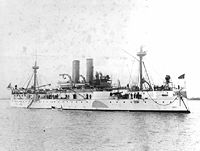   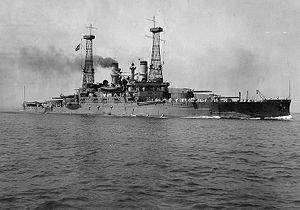 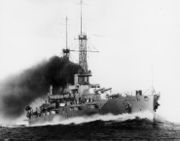  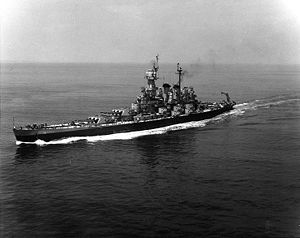 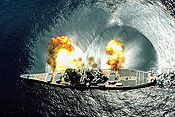 |
|
Except for Kearsarge
USS Kearsarge (BB-5)
USS Kearsarge , the lead ship of her class of battleships, was the first ship of the United States Navy to be named, by act of Congress, in honor of the famous American Civil War sloop-of-war . Her keel was laid down by the Newport News Shipbuilding Company of Newport News, Virginia on 30 June...
, named by an act of Congress, all American battleships have been named for states, and every state has had at least one battleship named for it except Alaska
Alaska
Alaska is the largest state in the United States by area. It is situated in the northwest extremity of the North American continent, with Canada to the east, the Arctic Ocean to the north, and the Pacific Ocean to the west and south, with Russia further west across the Bering Strait...
and Hawaii
Hawaii
Hawaii is the newest of the 50 U.S. states , and is the only U.S. state made up entirely of islands. It is the northernmost island group in Polynesia, occupying most of an archipelago in the central Pacific Ocean, southwest of the continental United States, southeast of Japan, and northeast of...
. They did not become states until 1959, after the end of battleship building, although the Large Cruisers USS Alaska (CB-1)
USS Alaska (CB-1)
USS Alaska —the third ship to be named after the then-territory and present state—was the lead ship of a planned six "large cruiser"sMany contemporary historians believe that the Alaskas should be classified as battlecruisers instead. See Alaska class battlecruiser#"Large cruisers" or...
and USS Guam (CB-2)
USS Guam (CB-2)
USS Guam was an Alaska class large cruiser which served with the United States Navy during the end of World War II. She was the second and last ship of her class to be completed....
were built during WWII
World War II
World War II, or the Second World War , was a global conflict lasting from 1939 to 1945, involving most of the world's nations—including all of the great powers—eventually forming two opposing military alliances: the Allies and the Axis...
. The third of the class, USS Hawaii (CB-3)
USS Hawaii (CB-3)
USSTechnically, "USS" should not be in this article's title since this ship was never commissioned; however, it has been included here to adhere to the naming conventions of Wikipedia. Hawaii , the first United States Navy ship to be named after the Territory of Hawaii,Hawaii was not yet a state at...
, was never completed. Two battleships have been authorized to be named for Montana
Montana
Montana is a state in the Western United States. The western third of Montana contains numerous mountain ranges. Smaller, "island ranges" are found in the central third of the state, for a total of 77 named ranges of the Rocky Mountains. This geographical fact is reflected in the state's name,...
, but both were canceled before commissioning. The pre-dreadnoughts
USS Zrinyi (formerly the Austrian
SMS Zrinyi
SMS Zrinyi
SMS Zrínyi was a Radetzky-class pre-dreadnought battleship of the Austro-Hungarian Navy , named for the Zrinski, a noble Croatian family...
),
USS Radetzky (formerly the Austrian
SMS Radetzky
SMS Radetzky
SMS* Radetzky was the first of the three pre-dreadnought battleships built for the Austro-Hungarian Navy . She was named for the 19th century Austrian Field Marshal Joseph Radetzky von Radetz...
), and
USS Ostfriesland
SMS Ostfriesland
SMS Ostfriesland "SMS" stands for "Seiner Majestät Schiff" was the second vessel of the of battleships of the German Imperial Navy. Named for the region of East Frisia, Ostfrieslands keel was laid in October 1908 at the Kaiserliche Werft dockyard in Wilhelmshaven...
(formerly the German SMS Ostfriesland),
taken as prizes of war after World War I
World War I
World War I , which was predominantly called the World War or the Great War from its occurrence until 1939, and the First World War or World War I thereafter, was a major war centred in Europe that began on 28 July 1914 and lasted until 11 November 1918...
, were commissioned in the US Navy, but were not assigned hull classification symbol
Hull classification symbol
The United States Navy, United States Coast Guard, and United States National Oceanic and Atmospheric Administration use hull classification symbols to identify their ship types and each individual ship within each type...
s.
No American battleship has ever been lost at sea, though some have been sunk in port and others sunk as targets.
USS MaineUSS Maine (ACR-1)USS Maine was the United States Navy's second commissioned pre-dreadnought battleship, although she was originally classified as an armored cruiser. She is best known for her catastrophic loss in Havana harbor. Maine had been sent to Havana, Cuba to protect U.S. interests during the Cuban revolt...
- Displacement: 6,682 tons
- Armament: 4 × 10 in (250 mm) (2x2 en echelon); 6 × 6 in (152 mm) (6x1); 7 x 6 pounders (57 mm) (7x1); 8 x 1 pounders (0.5 kg) (8x1); 4 × 14 in (350 mm) surface torpedo tubes
- Speed: 17 knots
- Ships in class: 1
- Commissioned: 17 September 1895
- Fate: Sunk by explosion 15 February 1898
.jpg)
USS TexasUSS Texas (1892)USS Texas was a second-class pre-dreadnought battleship built by the United States in the early 1890s. She was the first American battleship and the first ship named in honor of the state of Texas to be built by the United States...
- Displacement: 6,682 tons
- Armament: 2 × 12 in (305 mm) (2x1 en echelon); 6 × 6 in (152 mm) (6x1); 12 x 6 pounders (2.7 kg) (12x1); 6 x 1 pounders (6x1); 4 then 2 (fore and aft tubes removed 1897) x 14 inch (356 mm) torpedo tubes
- Speed: 18 knots
- Ships in class: 1
- Commissioned: 15 August 1895
- Fate: Decommissioned 1 February 1911, then sunk as a target in Tangier Sound in Chesapeake Bay.

Indiana classIndiana class battleshipThe three Indiana-class battleships were the first battleships to be built by the United States Navy comparable to contemporary European ships, such as the British . Authorized in 1890 and commissioned between November 1895 and April 1896, they were relatively small battleships with heavy armor and...
- Displacement: 10,288 tons
- Armament: 4 × 13 in (330 mm) (2x2), 8 × 8 in (203 mm) (4x2), 4 × 6 in (152 mm) (4x1), 20 x 6-pounders (20x1), 6 x 1-pounders (6x1), 4 Gatling gunGatling gunThe Gatling gun is one of the best known early rapid-fire weapons and a forerunner of the modern machine gun. It is well known for its use by the Union forces during the American Civil War in the 1860s, which was the first time it was employed in combat...
s (4x1), 6 × 18 in (457 mm) surface torpedo tubes - Speed: 15 knots
- Ships in class: 3: USS IndianaUSS Indiana (BB-1)USS Indiana was the lead ship of her class and the first battleship in the United States Navy comparable to foreign battleships of the time. Authorized in 1890 and commissioned five years later, she was a small battleship, though with heavy armor and ordnance. The ship also pioneered the use of an...
, USS MassachusettsUSS Massachusetts (BB-2)USS Massachusetts was an and the second United States Navy ship comparable to foreign battleships of the time. Authorized in 1890 and commissioned six years later, she was a small battleship, though with heavy armor and ordnance. The ship class also pioneered the use of an intermediate battery...
, and USS OregonUSS Oregon (BB-3)USS Oregon was a pre-Dreadnought of the United States Navy. Her construction was authorized on 30 June 1890, and the contract to build her was awarded to Union Iron Works of San Francisco, California on 19 November 1890. Her keel was laid exactly one year later... - Commissioned: 20 November 1895
- Fate: Decommissioned 17 July 1920; Indiana and Massachusetts sunk as targets; Oregon preserved as memorial 1936, scrapped 1956

USS IowaUSS Iowa (BB-4)| The second half of the 19th century saw radical changes in shipbuilding design. Wood-built sailing ships with cannons were replaced by steam-powered warships armored with steel...
- Displacement: 11,346 tons
- Armament: 4 × 12 in (305 mm) (2x2), 8 × 8 in (203 mm) (4x2), 6 × 4 in (102 mm) guns (6x1), 20 x 6-pounders (20x1), 4 x 1-pounders (4x1), 4 × 14 in (356 mm) torpedo tubes
- Speed: 17 knots
- Ships in class: 1
- Commissioned: 16 June 1897
- Fate: Decommissioned 31 March 1919, then sunk as bombing target.
Kearsarge classKearsarge class battleshipThe Kearsarge class was a two-ship class of battleships built for the United States Navy at the beginning of the 20th century. Its first ship, the , was commissioned in 1900. The lead ship of this class, USS Kearsarge, was the only United States battleship not named for a state.- Ship history :This...
- Displacement: 11,540 tons
- Armament: 4 × 13 in (330 mm) (2x2), 4 × 8 in (203 mm) (2x2), 14 × 6 in (152 mm) (14x1), 20 x 6-pounders (20x1), 8 x 1-pounders (8x1), 4 x 30-caliber machineguns
- Speed: 15 knots
- Ships in class: 2: USS KearsargeUSS Kearsarge (BB-5)USS Kearsarge , the lead ship of her class of battleships, was the first ship of the United States Navy to be named, by act of Congress, in honor of the famous American Civil War sloop-of-war . Her keel was laid down by the Newport News Shipbuilding Company of Newport News, Virginia on 30 June...
and USS KentuckyUSS Kentucky (BB-6)USS Kentucky , a Kearsarge-class battleship, was launched on 24 March 1898 by Newport News Shipbuilding & Dry Dock Company of Newport News, Virginia, sponsored by Miss Christine Bradley, daughter of Governor William O'Connell Bradley of Kentucky, and commissioned on 15 May 1900, Captain Colby M... - Commissioned: 20 February 1900
- Fate: Decommissioned 29 May 1920
_1912.jpg)
Illinois classIllinois class battleshipThe Illinois-class battleships were pre-dreadnought battleships of the United States Navy commissioned at the beginning of the 20th century. The first ship of its class, the , was commissioned in 1901...
- Displacement: 11,565 tons
- Armament: 4 × 13 in (330 mm) (2x2), 14 × 6 in (152 mm) (14x1), 16 x 6 pounders (2.7 kg) (16x1), 6 x 1 pounders (454 g) (6x1), 4 torpedo tubes
- Speed: 17 knots
- Ships in class: 3: USS IllinoisUSS Illinois (BB-7)USS Illinois , the second ship of the United States Navy to be named for the 21st state, was a battleship, the lead ship of her class....
, USS AlabamaUSS Alabama (BB-8)USS Alabama was an pre-dreadnought style battleship in the United States Navy. She was the second ship to carry her name.Alabama was laid down on 1 December 1896 at Philadelphia, Pennsylvania, by the William Cramp and Sons Ship and Engine Building Company. She was launched on 18 May 1898...
, and USS WisconsinUSS Wisconsin (BB-9)USS Wisconsin , an Illinois-class battleship, was the first ship of the United States Navy to be named for the 30th state.The keel of Battleship No. 9 was laid down on 9 February 1897 at San Francisco, California, by the Union Iron Works... - Commissioned: 16 October 1900
- Fate: Decommissioned 17 July 1920

Maine classMaine class battleshipThe three Maine class battleships: , , and were launched in the first several years of the 20th century. These were the first US capital ships to use smokeless powder for their main batteries, and the last to use Harvey armor. Smokeless powder allowed a decrease in gun size, with an increase in...
- Displacement: 12,500 tons
- Armament: 4 × 12 in (305 mm) (2x2), 16 × 6 in (152 mm) (16x1), 6 × 3 in (76 mm) (6x1), 8 x 3-pounder guns (8x1), 6 x 1-pounders (6x1), 3 x .30-caliber machine guns (3x1), 2 × 18 in (457 mm) submerged torpedo tubes
- Speed: 18 knots
- Ships in class: 3: USS MaineUSS Maine (BB-10)USS Maine , the lead ship of her class of battleships, was the second ship of the United States Navy to be named in honor of the 23rd state....
, USS MissouriUSS Missouri (BB-11)USS Missouri , a Maine-class battleship, was the third ship of the United States Navy to be named in honor of the 24th state....
, and USS OhioUSS Ohio (BB-12)USS Ohio , a Maine-class battleship, was the third ship of the United States Navy named for the 17th state.Ohio was laid down on 22 April 1899 by Union Iron Works, San Francisco, California. She was launched on 18 May 1901 sponsored by Miss Helen Deschler, a relative of Governor George K. Nash of... - Commissioned: 29 December 1902
- Fate: Decommissioned 31 May 1922

Virginia classVirginia class battleshipThe Virginia class battleship was designed to be the first truly seagoing U.S. battleships. Five ships were commissioned between 1906 and 1907. The ships participated in the round-the-world cruise of the Great White Fleet. For the second and last time, the U.S...
- Displacement: 15,000 tons
- Armament: 4 × 12 in (305 mm) (2x2), 8 × 8 in (203 mm) (4x2), 12 × 6 in (152 mm) guns (12x1), 24 1-pounders (24x1), 4 × 21 in (533 mm) torpedo tubes
- Armor: Belt 11 inches; Turret 12 inches; Deck 3 inches
- Speed: 19 knots
- Ships in class: 5: USS VirginiaUSS Virginia (BB-13)USS Virginia was a United States Navy battleship, the lead ship of her class of five. She was the fifth ship to carry her name.Virginia was laid down on 21 May 1902 Newport News Shipbuilding and Dry Dock Company, Newport News, Virginia; launched on 6 April 1904; sponsored by Miss Gay Montague,...
, USS NebraskaUSS Nebraska (BB-14)USS Nebraska was a Virginia-class pre-dreadnought battleship of the United States Navy. She was the first ship to carry her name.- History :...
, USS GeorgiaUSS Georgia (BB-15)USS Georgia was a United States Navy . She was the first ship to carry her name.Georgia was launched by the Bath Iron Works of Bath, Maine on 11 October 1904, sponsored by Miss Stella Tate, sister of Georgia Congressman Farish Carter Tate and commissioned at Boston Navy Yard on 24 September 1906,...
, USS New JerseyUSS New Jersey (BB-16)USS New Jersey was a Virginia-class battleship of the United States Navy. She was the first ship to carry her name. New Jersey was launched on 10 November 1904 by Fore River Shipbuilding Company, Quincy, Massachusetts; sponsored by Mrs. William B. Kenney, daughter of Governor Franklin Murphy of...
, and USS Rhode IslandUSS Rhode Island (BB-17)USS Rhode Island was a Virginia-class battleship of the United States Navy. She was the second ship to carry her name.Rhode Island was launched on 17 May 1904 by Fore River Shipbuilding Company, Quincy, Massachusetts, sponsored by Mrs. F. O... - Commissioned: 19 February 1902
- Fate: Decommissioned 13 August 1920
Connecticut classConnecticut class battleship- External links :...
- Displacement: 16,000 tons
- Armament: 4 × 12 in (305 mm) (2x2), 8 × 8 in (203 mm) (4x2), 12 × 7 in (178 mm) (12x1), 10 × 3 in (76 mm) (10x1), 4 × 21 in (533 mm) torpedo tubes
- Armor:
- Speed: 18 knots
- Ships in class: 6: USS ConnecticutUSS Connecticut (BB-18)USS Connecticut , the fourth United States Navy ship to be named after the state of Connecticut, was the lead ship of her class of six. Her keel was laid on 10 March 1903; launched on 29 September 1904, Connecticut was commissioned on 29 September 1906 as the most advanced ship in the U.S...
, USS LouisianaUSS Louisiana (BB-19)USS Louisiana was a of the United States Navy. She was the third ship to carry her name.Louisiana was laid down on 7 February 1903 by the Newport News Shipbuilding & Dry Dock Company of Newport News, Virginia; launched on 27 August 1904; sponsored by Miss Juanita LaLande and commissioned on 2...
, USS VermontUSS Vermont (BB-20)USS Vermont , a , was the second ship of the United States Navy named for the 14th state.Vermont was laid down on 21 May 1904 at Quincy, Massachusetts, by the Fore River Shipbuilding Company. She was launched on 31 August 1905 sponsored by Miss Jennie Bell, the daughter of Governor Charles J...
, USS KansasUSS Kansas (BB-21)USS Kansas was a US commissioned in 1907 and decommissioned in 1921. She was the second ship of the United States Navy named in honor of Kansas.-Pre-World War I:...
, USS MinnesotaUSS Minnesota (BB-22)USS Minnesota , a , was the second ship of the United States Navy in honor of the 32nd state, and the 24th battleship of the US Navy ....
, and USS New HampshireUSS New Hampshire (BB-25)The second United States Navy New Hampshire was a . New Hampshire was the last American pre-dreadnought battleship, though she was commissioned two years after HMS Dreadnought.... - Commissioned: 1906
- Fate: Decommissioned 1923

Mississippi classMississippi class battleshipThe Mississippi class of battleships comprised two ships which were authorized in the 1903 naval budget: and . They were the last pre-dreadnought battleships to be designed for the United States Navy; however, they were not the last to be built as one more ship of a prior design was completed...
- Displacement: 13,000 tons
- Armament: 4 × 12 in (305 mm) (2x2), 8 × 8 in (203 mm) (4x2), 8 × 7 in (178 mm) (8x1), 12 × 3 in (76 mm) (12x1), 6 x 3 pounder gun3 pounder gun3 pounder gun, 3 pounder, 3-pdr or QF 3-pdr is an abbreviation typically referring to a gun which fired a projectile weighing approximately 3 pounds...
(6x1), 2 x 1-pounder Mark 6 (2x1), 6 x .30-caliber machine guns (6x1), 2 × 21 in (533 mm) torpedo tubes - Armor:
- Speed: 17 knots
- Ships in class: 2: USS MississippiUSS Mississippi (BB-23)USS Mississippi , the lead ship of her class of battleships, was the second ship of the United States Navy named in honor of the U.S. state of Mississippi. After her career in the USN, she was sold to Greece and renamed Kilkis in 1914...
and USS IdahoUSS Idaho (BB-24)USS Idaho , the second ship of her class of battleships, was the second ship of the United States Navy named in honor of the U.S. state of Idaho. After her career in the USN, she was sold to Greece and renamed Limnos in 1914. Limnos was sunk by German bombers in April 1941... - Commissioned: 1 February 1908
- Fate: Decommissioned 30 July 1914 and sold to Greece. Ex-Mississippi and ex-Idaho sunk by German bombers in April 1941.
South Carolina classSouth Carolina class battleshipThe United States Navy's South Carolina class consisted of two battleships: and , both of which were launched in 1908. These were among the first warships built with armament organized on the "all-big gun" and the first American battleships of the type...
- Displacement: 16,000 tons
- Armament: 8 × 12 in (305 mm) guns (4x2), 22 × 3 in (76 mm) (22x1), 2 x 3 pounder (2x1), 2 × 21 in (533 mm) torpedo tubes
- Armor:
- Speed: 17 knots
- Ships in class: 2: USS South CarolinaUSS South Carolina (BB-26)USS South Carolina , the lead ship of her class of dreadnought battleships, was the fourth ship of the United States Navy to be named in honor of the eighth state, and was the first American dreadnought or all-big gun battleship....
and USS MichiganUSS Michigan (BB-27)USS Michigan , a South Carolina-class battleship, was the second ship of the United States Navy to be named in honor of the 26th state. She was the first battleship in the world to be commissioned with superimposed, or Superfire type turrets.... - Commissioned: both in 1910
- Fate: Decommissioned 1921 and 1922, both sold for scrap

Delaware classDelaware class battleshipThe Delaware-class battleships of the United States Navy were the second class of American dreadnoughts. They carried a battery of ten 12"/45 caliber Mark 5 guns in five turrets, an increase of two guns over the preceding . They were also larger, displacing 25% more than the South Carolinas...
- Displacement: 20,380 tons
- Armament: 10 × 12 in (305 mm) (5x2), 14 × 5 in (127 mm) (14x1), 22 × 3 in (76 mm) (22x1), 2 x 3 pounder (2x1) guns, 2 × 21 in (533 mm) torpedo tubes
- Armor:
- Speed: 21 knots
- Ships in class: 2: USS DelawareUSS Delaware (BB-28)USS Delaware of the United States Navy was a battleship launched in 1909 and scrapped in 1924, the lead ship of the Delaware class. She was part of the U.S...
and USS North DakotaUSS North Dakota (BB-29)USS North Dakota , a Delaware-class battleship, was the first ship of the United States Navy named in honor of the U.S. state of North Dakota.... - Commissioned: both in 1910
- Fate: both decommissioned 1923 and sold for scrap

Florida classFlorida class battleshipThe Florida-class battleships of the United States Navy comprised two ships: and . They were, in general, similar to the preceding Delaware-class design, but were slightly larger. The two ships of this class were launched in 1910 and 1909, respectively, and both were commissioned in 1911. This was...
- Displacement: 21,800 tons
- Armament: 10 × 12 in (305 mm) (5x2), 16 × 5 in (127 mm) (16x1), 2 × 21 in (533 mm) torpedo tubes
- Armor:
- Speed: 21 knots
- Ships in class: 2: USS FloridaUSS Florida (BB-30)-External links:***...
and USS UtahUSS Utah (BB-31)USS Utah was a battleship that was attacked and sunk in Pearl Harbor on 7 December 1941. A Florida-class battleship, she was the only ship of the United States Navy to be named for the U.S. state of Utah... - Commissioned: both in 1911
- Fate: Florida scrapped in 1932, Utah became target ship (AG-16) in 1931, sunk at Pearl HarborPearl HarborPearl Harbor, known to Hawaiians as Puuloa, is a lagoon harbor on the island of Oahu, Hawaii, west of Honolulu. Much of the harbor and surrounding lands is a United States Navy deep-water naval base. It is also the headquarters of the U.S. Pacific Fleet...
in 1941

Wyoming classWyoming class battleshipThe Wyoming class battleship was the fourth series of two battleships built for the United States Navy. The class comprised two ships: and . At the time of the design of this pair of dreadnoughts, not a single one of the previous designs had yet gone to sea...
- Displacement: 27,200 tons
- Armament: 12 × 12 in (305 mm) (6x2), 21 × 5 in (127 mm) (21x1), two 3-inch (3x1), 2 × 21 in (533 mm) torpedo tubes
- Armor:
- Speed: 21 knots
- Ships in class: 2: USS WyomingUSS Wyoming (BB-32)USS Wyoming , the lead ship of her class of battleship, was the third ship of the United States Navy named Wyoming, although it was only the second named in honor of the 44th state....
and USS ArkansasUSS Arkansas (BB-33)USS Arkansas , a was the third ship of the United States Navy named in honor of the 25th state.A dreadnought battleship, Arkansas was laid down on 25 January 1910 at Camden, New Jersey, by the New York Shipbuilding Corporation. She was launched on 14 January 1911 sponsored by Miss Nancy Louise... - Commissioned: both in 1912
- Fate: Wyoming became a training ship (AG-17) in 1931, decommissioned in 1947. Arkansas sunk at Operation CrossroadsOperation CrossroadsOperation Crossroads was a series of nuclear weapon tests conducted by the United States at Bikini Atoll in mid-1946. It was the first test of a nuclear weapon after the Trinity nuclear test in July 1945...
in 1946

New York classNew York class battleshipThe New York class battleship was the fifth series of two super-dreadnought battleships of the United States Navy which served during World War I and World War II. The class represented the first use of the 14" naval gun by the U.S. Navy...
- Displacement: 27,200 tons
- Armament: 10 × 14 in (356 mm) (5x2), 21 5-inch (21x1), two 3-inch (2x1), 2 × 21 in (533 mm) torpedo tubes
- Armor:
- Speed: 21 knots
- Ships in class: 2: USS New YorkUSS New York (BB-34)USS New York was a United States Navy battleship, the lead ship of her class of two . She was the fifth ship to carry her name....
and USS TexasUSS Texas (BB-35)USS Texas , the second ship of the United States Navy named in honor of the U.S. state of Texas, is a . The ship was launched on 18 May 1912 and commissioned on 12 March 1914.... - Commissioned: both in 1914
- Fate: New York sunk as target in 1948, Texas preserved as a memorial 1948
Standard type

Nevada classNevada class battleshipThe Nevada class battleships were the United States Navy's first battleship design equipped with triple gun turrets , as well as introducing the so-called "all or nothing" armor scheme, in which protection of vital areas was optimized against heavy caliber guns, leaving other parts...
- Displacement: 27,500 tons
- Armament: 10 × 14 in (356 mm) (2x3, 2x2), 21 × 5 in (127 mm) (21x1), 4 × 21 in (533 mm) torpedo tubes
- Armor:
- Speed: 20 knots
- Ships in class: 2: USS NevadaUSS Nevada (BB-36)USS Nevada , the second United States Navy ship to be named after the 36th state, was the lead ship of the two Nevada-class battleships; her sister ship was...
and USS OklahomaUSS Oklahoma (BB-37)USS Oklahoma , the only ship of the United States Navy to ever be named for the 46th state, was a World War I-era battleship and the second of two ships in her class; her sister ship was . She, along with her sister, were the first two U.S... - Commissioned: both in 1916
- Fate: Nevada sunk as target 1948; Oklahoma sunk at Pearl Harbor in 1941, raised and stripped of salvageable parts, sunk in route to scrapping 1947

Pennsylvania classPennsylvania class battleshipThe Pennsylvania-class battleships, of the United States Navy, were an enlargement of the Nevada class; having two additional 45-caliber main battery guns, greater length and displacement, four propellers and slightly higher speed...
- Displacement: 31,400 tons
- Armament: 12 × 14 in (356 mm) (4x3), 14 × 5 in (127 mm) (14x1), 4 × 3 in (76 mm) (4x1), 2 × 21 in (533 mm) torpedo tubes
- Armor:
- Speed: 21 knots
- Ships in class: 2: USS PennsylvaniaUSS Pennsylvania (BB-38)USS Pennsylvania was a United States Navy super-dreadnought battleship. She was the third Navy ship named for the state of Pennsylvania....
and USS ArizonaUSS Arizona (BB-39)USS Arizona, a , was built for the United States Navy in the mid-1910s. Named in honor of the 48th state's recent admission into the union, the ship was the second and last of the Pennsylvania class of "super-dreadnought" battleships. Although commissioned in 1916, the ship remained stateside... - Commissioned: both in 1916
- Fate: Pennsylvania sunk after Operation CrossroadsOperation CrossroadsOperation Crossroads was a series of nuclear weapon tests conducted by the United States at Bikini Atoll in mid-1946. It was the first test of a nuclear weapon after the Trinity nuclear test in July 1945...
in 1946, Arizona destroyed at Pearl Harbor in 1941, designated as a memorial.

New Mexico classNew Mexico class battleshipThe New Mexico class battleships of the United States Navy, all three of whose construction began in 1915, were improvements on the design introduced three years earlier with the Nevada class....
- Displacement: 32,000 tons
- Armament: 12 × 14 in (356 mm) (4x3), 14 × 5 in (127 mm) (14x1), 2 × 21 in (533 mm) torpedo tubes
- Armor:
- Speed: 21 knots
- Ships in class: 3: , USS MississippiUSS Mississippi (BB-41)USS Mississippi , a , was the third ship of the United States Navy named in honor of the 20th state, and the second battleship to carry the name. Commissioned in 1917, too late to serve in World War I, she served extensively in the Pacific in World War II, for which she earned eight battle stars...
, and USS IdahoUSS Idaho (BB-42)USS Idaho , a , was the fourth ship of the United States Navy to be named for the 43rd state. Her keel was laid down by the New York Shipbuilding Corporation of Camden, New Jersey... - Commissioned: New Mexico in 1918, Mississippi in 1917 and Idaho in 1919
- Fate: sold for scrap, New Mexico & Idaho in 1947. Mississippi became trials ship (AG-128) in 1946, scrapped in 1956
Tennessee classTennessee class battleshipThe Tennessee class was a class of battleships of the United States Navy. The class comprised two ships: and the . They were modified versions of the featuring improved underwater armor for better torpedo protection and 30 degree elevation on their main batteries, as opposed to 15 degrees for...

- Displacement: 32,000 tons
- Armament: 12 × 14 in (356 mm) (4x3), 14 × 5 in (127 mm) (14x1), 2 × 21 in (533 mm) torpedo tubes
- Armor:
- Speed: 21 knots
- Ships in class: 2: USS TennesseeUSS Tennessee (BB-43)USS Tennessee , the lead ship of her class of battleship, was the third ship of the United States Navy named in honor of the 16th US state. During World War II in the Pacific Theater, she was damaged during the attack on Pearl Harbor in December 1941 but was repaired and modernized...
, and USS CaliforniaUSS California (BB-44)USS California , a Tennessee-class battleship, was the fifth ship of the United States Navy named in honor of the 31st state. Beginning as the flagship of the Pacific Fleet, she served in the Pacific her entire career. She was sunk in the attack on Pearl Harbor at her moorings in Battleship Row,... - Commissioned: Tennessee in 1920, California in 1921
- Fate: both decommissioned 1947, sold for scrap 1959
Colorado classColorado class battleshipThe Colorado class battleships was a group of four battleships built by the United States Navy after World War I. However, only three of the ships were completed: , , and . The fourth, , was over 75% completed when she was canceled under the terms of the Washington Naval Treaty in 1922...

- Displacement: 32,600 tons
- Armament: 8 × 16 in (406 mm) (4x2), 12 × 5 in (127 mm) (12x1), 8 × 3 in (76 mm) (8x1), 2 × 21 in (533 mm) torpedo tubes
- Armor:
- Speed: 21 knots
- Ships in class: 4: USS ColoradoUSS Colorado (BB-45)USS Colorado , the third ship of the United States Navy named in honor of the 38th state, was the lead ship of her class of battleships. Her keel was laid down on 29 May 1919 by the New York Shipbuilding Corporation of Camden, New Jersey. She was launched on 22 March 1921 sponsored by Mrs. Max...
, USS MarylandUSS Maryland (BB-46)USS Maryland , a , was the third ship of the United States Navy to be named in honor of the seventh state.Her keel was laid down 24 April 1917 by Newport News Shipbuilding Company of Newport News, Virginia. She was launched on 20 March 1920, and sponsored by Mrs. E. Brook Lee, wife of the...
, USS WashingtonUSS Washington (BB-47)USS Washington , a , was the second ship of the United States Navy named in honor of the 42nd state. Her keel was laid down on 30 June 1919 at Camden, New Jersey, by the New York Shipbuilding Corporation. She was launched on 1 September 1921, sponsored by Miss Jean Summers, the daughter of...
, and USS West VirginiaUSS West Virginia (BB-48)USS West Virginia , a , was the second ship of the United States Navy named in honor of the 35th state.Her keel was laid down on 12 April 1920 by the Newport News Shipbuilding and Drydock Company of Newport News, Virginia. She was launched on 17 November 1921 sponsored by Miss Alice Wright Mann,... - Commissioned: Maryland in 1921, Colorado and West Virginia in 1923, Washington not completed and sunk as target
- Fate: Remaining three decommissioned 1947 and sold for scrap 1959.
South Dakota classSouth Dakota class battleship (1920)The first South Dakota class was a class of six battleships, laid down in 1920 but never completed. These battleships would have been the last dreadnoughts to be commissioned, if the Washington Naval Treaty not caused their cancellation one-third of the way through their construction, they would...
- Displacement: 43,200 tons
- Armament: 12 × 16 in (406 mm) (4x3), 16 × 6 in (152 mm) (16x1), 8 × 3 in (76 mm) (8x1), 2 × 21 in (533 mm) torpedo tubes
- Armor:
- Speed: 23 knots
- Ships in class: 6: USS South Dakota, USS Indiana, USS Montana, USS North Carolina, USS Iowa, and USS Massachusetts
- Commissioned: None commissioned
- Fate: All cancelled prior to launch in 1923; scrapped on slip
North Carolina classNorth Carolina class battleshipThe North Carolina class was a group of two fast battleships, North Carolina and Washington, built for the United States Navy in the late 1930s and early 1940s...
- Displacement: 35,000 tons
- Armament: 9 × 16 in (406 mm) (3x3), 20 × 5 in (127 mm) (10x2), 16 x 1.1 inch AA (4x4)
- Armor: 11in Belt / 7in Deck
- Speed: 28 knots
- Ships in class: 2: USS North CarolinaUSS North Carolina (BB-55)USS North Carolina was the lead ship of her class of battleship and the fourth in the United States Navy to be named in honor of this U.S. state. She was the first new-construction U.S. battleship to enter service during World War II, participating in every major naval offensive in the Pacific...
and USS WashingtonUSS Washington (BB-56)USS Washington , the second of two battleships in the North Carolina class, was the third ship of the United States Navy named in honor of the 42nd state. Her keel was laid down on 14 June 1938 at the Philadelphia Naval Shipyard. Launched on 1 June 1940, Washington went through fitting-out before... - Commissioned: 1941
- Fate: North Carolina preserved as memorial 1965; Washington scrapped 1962

South Dakota classSouth Dakota class battleship (1939)The South Dakota-class was a group of four fast battleships built by the United States Navy. They were the second class of battleships to be named after the 40th State; the first class was designed in the 1920s and canceled under the terms of the Washington Naval Treaty. The class comprised four...
- Displacement: 38,000 tons
- Armament: 9 × 16 in (406 mm) (3x3), 20 (16 on South Dakota) x 5 inch (10 or 8 x 2), up to 40 x 40mm AA (17x4), up to 76 x 20 mm AA (76x1), 3 aircraft
- Armor: 12in Belt / 7.5in Deck
- Speed: 27 knots
- Ships in class: 4: USS South DakotaUSS South Dakota (BB-57)USS South Dakota was a battleship in the United States Navy from 1942 until 1947. The lead ship of her class, South Dakota was the third ship of the US Navy to be named in honor of the 40th state. During World War II, she first served in a fifteen-month tour in the Pacific theater, where she saw...
, USS IndianaUSS Indiana (BB-58)USS Indiana , a South Dakota-class battleship, was the fourth ship of the United States Navy named in honor of the 19th state. Her keel was laid down on 20 November 1939 by the Newport News Shipbuilding & Dry Dock Company of Newport News, Virginia. She was launched on 21 November 1941 sponsored by...
, USS MassachusettsUSS Massachusetts (BB-59)USS Massachusetts , known as "Big Mamie" to her crewmembers during World War II, was a battleship of the second South Dakota-class. She was the seventh ship of the United States Navy to be named in honor of the sixth state, and one of two ships of her class to be donated for use as a museum ship...
, and USS AlabamaUSS Alabama (BB-60)USS Alabama , a South Dakota-class battleship, was the sixth completed ship of the United States Navy named for the U.S. state of Alabama, however she was only the third commissioned ship with that name. Alabama was commissioned in 1942 and served in World War II in the Atlantic and Pacific... - Commissioned: 1942
- Fate: South Dakota and Indiana scrapped 1960; Alabama preserved as memorial 1964 Massachusetts preserved as memorial 1965

Iowa classIowa class battleshipThe Iowa-class battleships were a class of fast battleships ordered by the United States Navy in 1939 and 1940 to escort the Fast Carrier Task Forces which would operate in the Pacific Theater of World War II. Six were ordered during the course of World War II, but only four were completed in...
- Displacement: 48,500 tons
- Armament: 9 × 16 in (406 mm) (3x3), 20 × 5 in (127 mm) (10x2), 80 x 40mm AA (20x4), 49 x 20 mm AA (49x1) (1980s modification added 32 x Tomahawk and 16 x Harpoon missiles and 4 x Phalanx CIWS, and deleted 8 5-in guns and all other light anti-aircraft gun systems)
- Armor: 12in Belt / 8in Deck
- Speed: 33 knots
- Ships in class: 6: USS IowaUSS Iowa (BB-61)USS Iowa was the lead ship of her class of battleship and the fourth in the United States Navy to be named in honor of the 29th state...
, USS New JerseyUSS New Jersey (BB-62)USS New Jersey , is an , and was the second ship of the United States Navy to be named in honor of the U.S. state of New Jersey. New Jersey earned more battle stars for combat actions than the other three completed Iowa-class battleships, and is the only U.S...
, USS MissouriUSS Missouri (BB-63)|USS Missouri is a United States Navy Iowa-class battleship, and was the fourth ship of the U.S. Navy to be named in honor of the U.S. state of Missouri...
, USS WisconsinUSS Wisconsin (BB-64)USS Wisconsin , "Wisky" or "WisKy", is an , the second ship of the United States Navy to be named in honor of the U.S. state of Wisconsin...
, USS IllinoisUSS Illinois (BB-65)USS Illinois was to be the fifth constructed for the United States Navy and was the fourth ship to be named in honor of the 21st US state....
, and USS KentuckyUSS Kentucky (BB-66)USS Kentucky was to be the sixth and final constructed for the United States Navy; she was the second ship to be named in honor of Kentucky... - Commissioned: Four commissioned; first Iowa 1943; last Wisconsin 1944.
- Fate: Iowa in mothball fleet at Suisun BaySuisun BaySuisun Bay is a shallow tidal estuary at in northern California, USA. It lies at the confluence of the Sacramento and San Joaquin Rivers, forming the entrance to the Sacramento-San Joaquin River Delta, an inverted river delta...
, California; Missouri decommissioned for the second time in 1992, preserved as memorial at Pearl Harbor Hawaii since May 4, 1998 and is maintained by the non-profit USS Missouri Memorial Association; Wisconsin preserved as memorial Norfolk, Virginia; New Jersey preserved as memorial in Camden, NJ; Illinois cancelled and scrapped on slip; Kentucky launched 1950, not completed, scrapped 1958.

Montana classMontana class battleshipThe Montana-class battleships of the United States Navy were planned as successors to the , being slower but larger, better armored, and having superior firepower...
- Displacement: 65,000 tons
- Armament: 12 × 16 in (406 mm) (4x3), 20 × 5 in (127 mm) (10x2), undesignated number of 40 mm and 20 mm
- Armor: 16in Belt / 8.2in Deck
- Speed: 28 knots
- Ships in class: 5: USS Montana, USS Ohio, USS Maine, USS New Hampshire, and USS Louisiana
- Commissioned: None commissioned
- Fate: All cancelled in 1943 before being laid down
See also
- Arsenal shipArsenal shipAn arsenal ship is a concept for a floating missile platform intended to have as many as five hundred vertical launch bays for mid-sized missiles, most likely cruise missiles...
- List of ships of the line of the United States Navy
- USS Recruit (1917)

